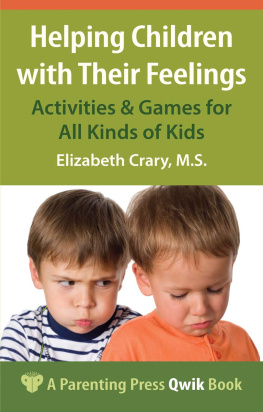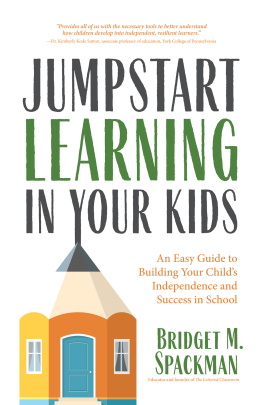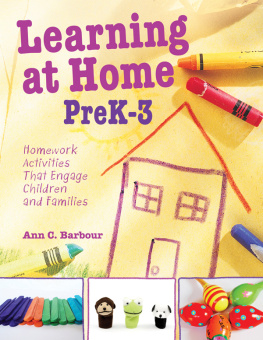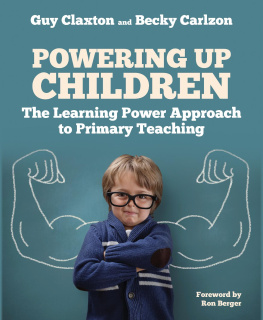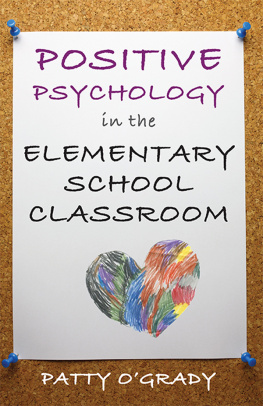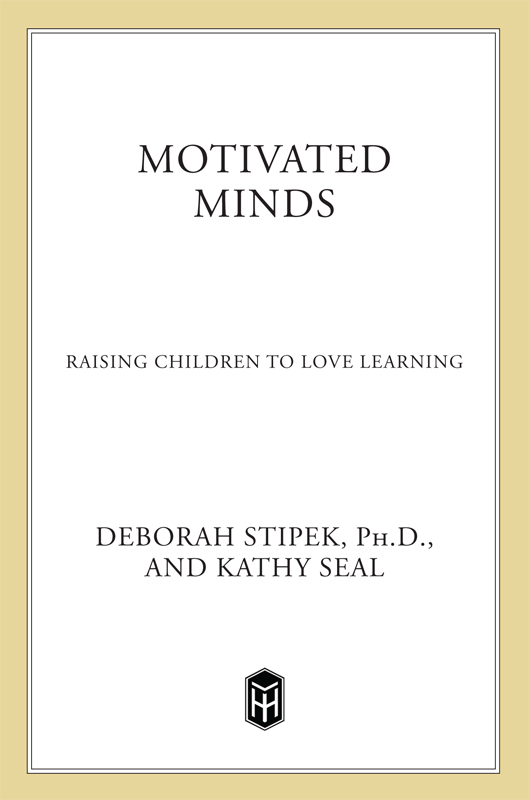Contents
Guide

The author and publisher have provided this e-book to you for your personal use only. You may not make this e-book publicly available in any way. Copyright infringement is against the law. If you believe the copy of this e-book you are reading infringes on the authors copyright, please notify the publisher at: us.macmillanusa.com/piracy.
CONTENTS
Kathy: To Zach, Jeff, and Jim, who understood, supported, and celebrated.
Deborah: To my parents, who always encouraged and never demanded, and my daughterliving proof that children can love learning.
AUTHORS NOTE
To simplify our stories and include both our experiences, we have combined ourselves into one person, the I of our narrative. We also merged our childrenDeborahs daughter, Meredith, and Kathys sons, Zach and Jeffinto one literary family.
There are many references in this book to UES, the Corinne Seeds University Elementary School. UES is the laboratory school of UCLA, where innovative educational practices are developed, assessed, and disseminated. The school is committed to providing an educational program that promotes the joy of learning in children. Deborah was the director of UES from 1991 to 2000 and both Deborahs and Kathys children attended the school.
ACKNOWLEDGMENTS
Kathy
Writing this book has been enormously enjoyable, not least because of the support of my family and friends, and their enthusiasm for the topic.
First Id like to thank the trio of psychologists who were so generous with their time and from whom I always felt altruistic impulses as they explained their work unstintingly and sent copies of their papers, sharing pertinent personal anecdotes along the way: Carol Dweck, Richard Ryan, and Marty Covington, thanks for your research and your help. Jim Stigler, Wendy Grolnick, Sandra Graham, and Sharon Nelson-LeGall also contributed key interviews. Im grateful as well to Angela Ebron and Sylvia Barsotti, Richard Atcheson and Nelson Algren Jr., who saw the value of these ideas, commissioning and editing gracefully my articles in Lears and Family Circle.
A number of educators have also been quite helpful. Thanks to Sandra Waite-Stupiansky of the NAEYC play caucus and Joe Sperling for their help with the chapter on play, and to Jeff Howard for the work of the Efficacy Institute and their get-smart formulation of Carol Dwecks work. Most especially Id like to thank Betty Factor, Lucia Diaz, June Payne, Dr. Saundra Sperling, Rena Ellis, and the many others at the Mar Vista Family Center who practice the theories in this book every day, and have shown how to apply in particular the concept of autonomy to raising children. I appreciate as well the help of Phil Platzman and Steve Eisenberg in illuminating the playfulness of Richard Feynman.
I could not have coauthored this book without the interest and help of friends and fellow writers: Linda Marsa, who said, Why dont you write a book?; Barbara and Danny Sabbeth, who provided me a home in New York City and, more important, their love and encouragement; and my writers group and good friends who traveled the book proposal and writing route with me, offering wise support and supplying fine anecdotes from their own lives when I asked: Julia Maher, Dorothy Chin, Barbara Beebe, Elizabeth Stanley, Gayle Pollard, Henry Unger, Armin and Mary Fields, and Leonia Kurgin. Hero medals go to Julia, Dorothy, and Barbarathe most highly educated typing crew everwho unhesitatingly rotated at my computer during a dreadful deadline weekend when I was convinced (erroneously) that I was suffering from severe repetitive stress injury.
Several friends and relatives also took time out from their busy lives to read and comment most helpfully on the entire manuscript, from their points of view both professional and parental: Ann Shenkin, Susie Kaplan, Richard Cohen, and Margaret Lee. Im very grateful for their thoughtful suggestions. Beth Howard also unselfishly smoothed my way.
Our agent Heide Lange has been invaluable. Thanks also to our editor, David Sobel, for his sharp and constructive critique, and to Heide and David, parents both, for understanding and believing in this project. To the crew at HoltMaggie Richards, Elizabeth Shreve, David Shue, and Sarah Hutsonthanks for your expertise and hard work.
Crucial too were those standing behind memy father and fellow author, Henry Shenkin; Reva Kaplan; and my siblings Budd, Bob, and Emily (my lawyer), who each assisted in a different way. I thank too my helpful and sweet laboratory subjects, Zach and Jeff, and my husband, Jim, for his unstinting support and love.
Deborah
Thanks also to Frances Forman, Janete Chun, and Rachel Longaker, who provided indispensable help.
Introduction
Have you ever said anything like this to your child?
I know youre in the middle of building your block castle, but youll just have to leave it for now and finish when we get back from the store.
Or:
Will you please get off the Internet so someone else in this house can use the phone? I dont care if you havent read everything there is on the Web about polar bears.
If comments like these sound familiar, it means youve seen your child intensely absorbed in work that demands brainpower. It means youve witnessed self-motivation up close and your child shows signs of loving learning.
Perhaps, however, your home sounds more like this one:
MOM : Jason, please get to your homework.
(A half-hour passes.)
DAD : Jason, have you started yet? It looks to me like all youre doing is staring into space.
(Fifteen minutes later.)
MOM (voice rising): Jason, stop fiddling around right now. Its almost bedtime and youve barely started your homework! If you want to go to the basketball game Saturday, you better start studying, and I mean now!
(Jason slams his bedroom door angrily and plays a Rage Against the Machine CD at maximum volume. Mom sinks to the couch, demoralized. Dad turns on Jeopardy. )
MOM (wailing): How long can this go on? I hate fighting every night.
DAD : Me too. Im starting to dread coming home.
Every child is born with a desire to learn. Indeed, most children enter kindergarten excited about learning to read and write, and eager to know about the world around them.
Yet by the time they reach middle school (and often before), many of our children are like Jason. They look on learning as drudgery, not the exciting opportunity that propelled them when they were little. The idea that learning can be fun all but disappearsas illustrated by a boy who thanked me for my gift of Tom Sawyer, then added, Ill read it later. I already did my book report for this semester.
So if youve noticed a lack of motivation in your child, youre not alone: research has shown that American childrens love of learning declines steadily from third through ninth grade.
It doesnt have to be that way.
Over the past thirty years, psychologists have conducted hundreds of studies that show what makes children want to learn. Their research tells us how to raise a child who is interested in academic work and even finds pleasure and joy in learning. It shows us how to raise children who seek intellectual challenges, and who plow on confidently even when the going gets tough.
I am going to show you how to raise just such an enthusiastic, lifelong learner, but first we have to move beyond some ideas that research has shown are misguided.
For the past several decades, parents have been told that the best way to encourage kids to learn is to puff up their self-esteem by piling on rewards and praise. Grades and prizes have been considered the most effective tools for motivating children to study.


